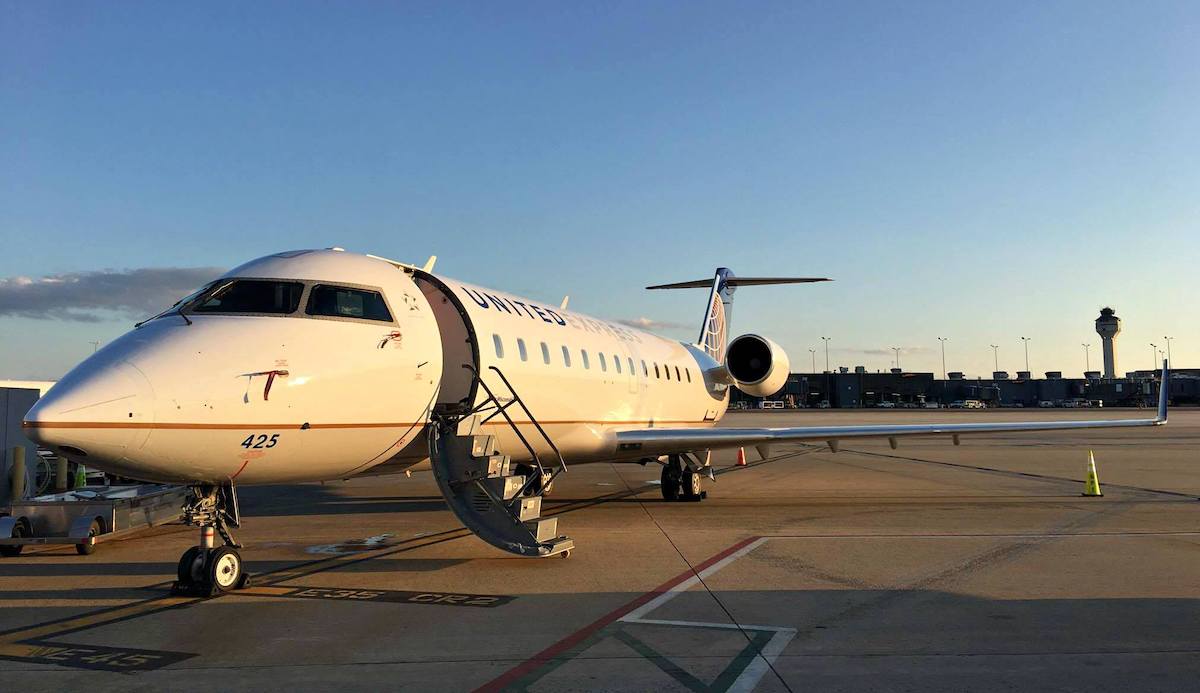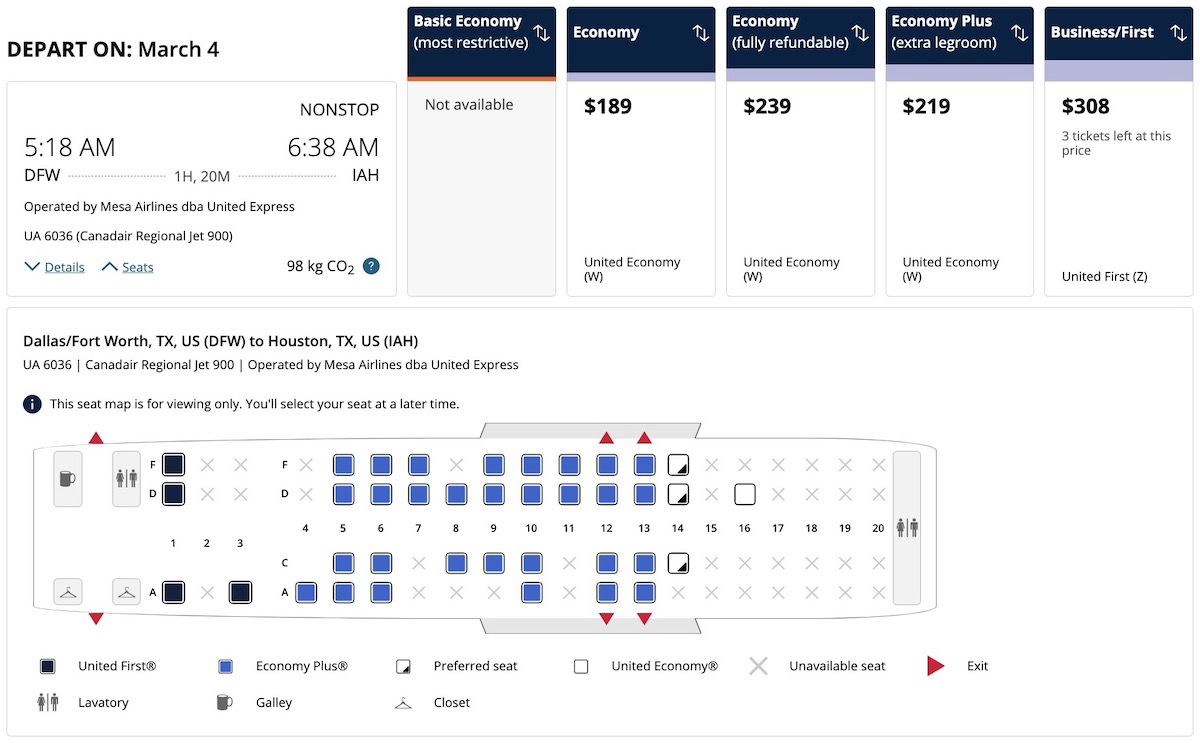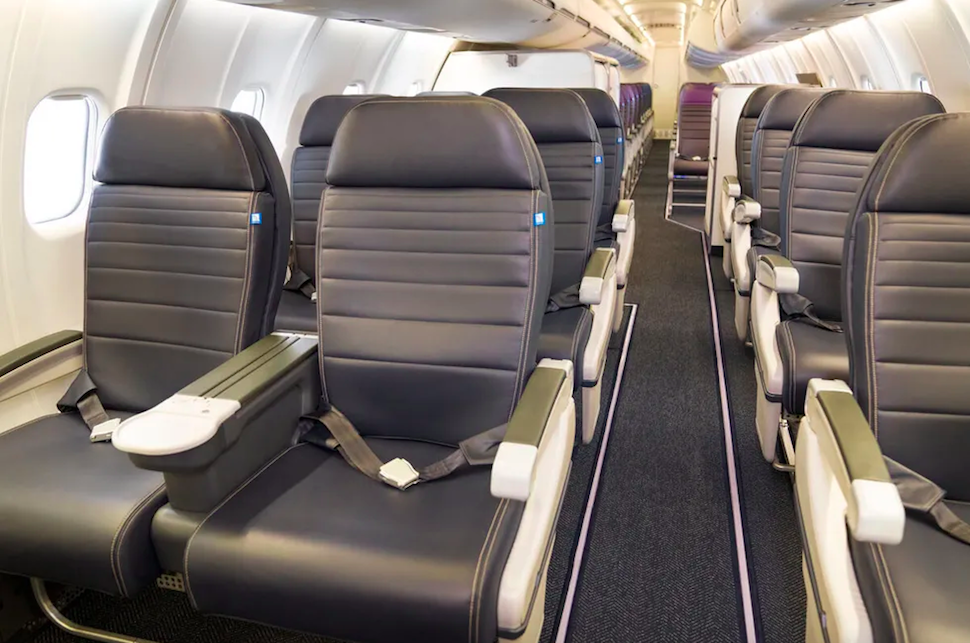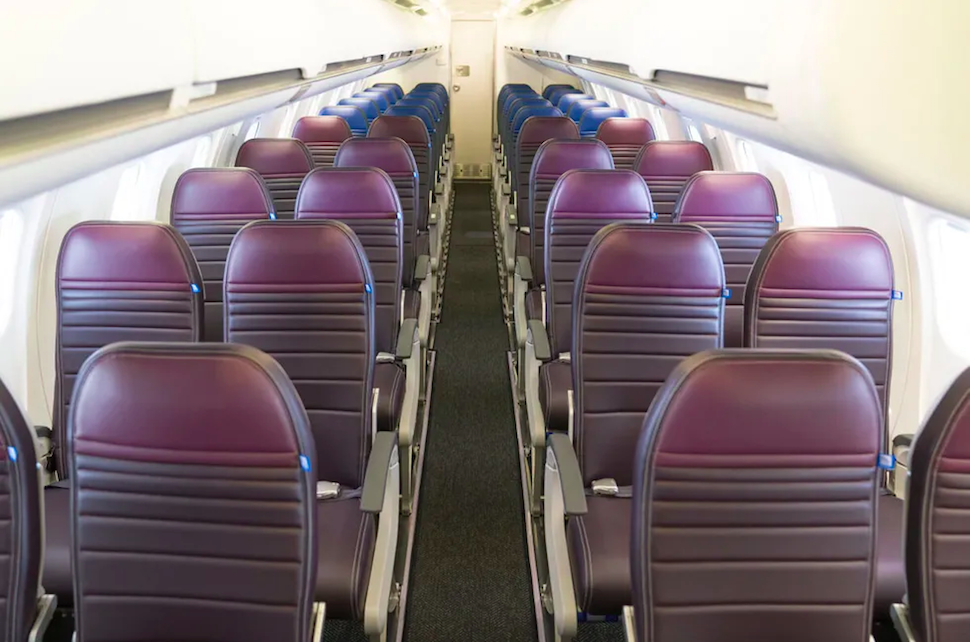In early March, United Airlines will start offering a new aircraft type on some regional flights, and it has the highest proportion of extra legroom economy seats we’ve ever seen…
In this post:
Mesa will fly CRJ-900s for United Express
The “big three” US carriers each outsource their flying of regional jets to other airlines. In some cases these airlines are wholly owned subsidiaries, while in other cases this flying is just contracted out.
We’re currently seeing a bit of musical chairs when it comes to regional partners in the United States:
- As of April 2023, American is contracting some flights to Air Wisconsin, which will be operating CRJ-200s on behalf of the airline; these previously operated flights on behalf of United
- American and Mesa have had a pretty rough breakup, so Mesa will completely stop flying for American, and as of March 2023 will instead start operating CRJ-900s on behalf of United
In other words, American and United have swapped Air Wisconsin and Mesa Airlines. I’d say that from a passenger experience standpoint, objectively United wins here, as United is getting CRJ-900s with first class and extra legroom economy, while American’s CRJ-200s are in a one class configuration.

United’s CRJ-900s are in a premium configuration
As reported by @IshrionA, Mesa will start operating flights on behalf of United as of March 4, 2023. The planes will initially serve destinations out of United’s Houston hub, and then as of June 2023 will start serving destinations out of United’s Denver hub.
What’s especially interesting to me is how these Mesa CRJ-900s are being configured when they fly United. They’ll feature a total of 76 seats, including:
- Nine first class seats
- 39 extra legroom economy seats
- 28 economy seats

Obviously that’s an incredibly spacious layout, as it’s not often you see more extra legroom economy seats than standard economy seats. What’s the logic for this? Well, United’s contract with pilots contains a scope clause, restricting the type of flying that can be outsourced.
United is only able to outsource flying for planes that have up to 76 seats. Even though the CRJ-900 ordinarily has a higher capacity than that, the plane is being reconfigured so it doesn’t exceed that limit.
This isn’t the first time that United has done something like this. The scope clause also has limits on how many planes can be operated by partners with more than 50 seats. So the airline has added some CRJ-700s to its fleet, which ordinarily seat 70+ passengers.
However, the plane has been rebranded as the CRJ-550, and instead features just 50 seats. This includes 10 first class seats, 20 extra legroom economy seats, and 20 standard economy seats.


Bottom line
As of March 2023, Mesa Airlines will start operating flights on behalf of United Airlines. Specifically, Mesa will operate some CRJ-900s on behalf of United Express, and they’ll feature just 76 seats. The plane will have 39 extra legroom economy seats and just 28 regular economy seats, which must be some sort of a record in terms of the ratio.
With this latest regional airline partner swap, customers on United’s CRJ-900s will certainly be more comfortable than customers on American’s CRJ-200s…
What do you make of United’s new CRJ-900s?





UA and Mesa win with this deal. I believe the CRJ-900 will also replace a lot of the CRJ-200s UA currently have running long routes such as DEN-SBP etc. I would like to see where all United will take this. There is a lot of potential here for United.
AA got the better deal. AWA will be doing shorter flights which the 200s are great for. Also, AWA and AA are in talks to get the 700s.
Mesa is going to grow and prosper under United..
Having taken a couple of Air Wisconsin flights lately, I must echo your opinion that UA wins in that trade. Little garbage CRJ-200s, delays on EVERY flight, and frankly some of the hand flying seemed like it was done by a novice. No, the CRJ-900 may not be the best but it's way better than the dreck that Air Wisconsin (as United Express) was offering up as service.
These CRJ-900s still require one to valet check a small rollaboard; a deal breaker for many. United has been innovative with the premium heavy CRJ-550 to address this (granted, it's only 50 seats, not 76). In general I avoid the CRJ-900 in favor of the ERJ-170/175.
The unaddressed question is where are the 39-odd EMB-175's that will have to be removed to comply with scope coming from?
It seems UA is substituting 39-odd superior EMB-175's for a like number of inferior CR9's.
A significant number of Mesa’s 175’s in the 70 seat “LL” configuration are already parked in Kingman due to pilot shortages. They are not replacing aircraft with the 900’s, but rather using them to fill the capacity that is currently parked. From Ornstein himself, the long term goal is to phase out the CRJ’s in favor of the EJET. Training all the CRJ crews on the 175 takes a huge toll on their already backlogged...
A significant number of Mesa’s 175’s in the 70 seat “LL” configuration are already parked in Kingman due to pilot shortages. They are not replacing aircraft with the 900’s, but rather using them to fill the capacity that is currently parked. From Ornstein himself, the long term goal is to phase out the CRJ’s in favor of the EJET. Training all the CRJ crews on the 175 takes a huge toll on their already backlogged training program, however, and takes time. One by one the parked LL’s will replace the 900’s as crews get qualified on the Ejet.
With the big sticker for me is what about the operational reliability of any CRJ’s? They always seem to have mechanicals and delays.
AA has 12 FC seats verses 9 and Mesa is a nightmare, unreliable service, dirty aircraft, frequently cancelling flights. AA has the better deal AW will fly flights under 1 hr and 30 minutes from midsize and small cities to feed AA's hub. AA has already improved service by having SkyWest and Envoy fly out of PHX, LAX and DFW. UA found a partner, but not a good one.
I WISH they were flying these IAH-LIT the number of times I crammed myself into a ERJ-135 on that route when I travelled it every week or so!
It’s still Mesa operating the aircraft.
Now if we could just get SkyWest to dump their CRJ-200’s!
Many of Mesa's CRJ-900s had 76 seats when they flew for American. But they had 12 first class seats instead of nine. However, there were a few grandfathered ex-US Airways aircraft that seated 79 and 80 passengers. American is reconfiguring some PSA CRJ-900s to take advantage of the grandfathering. It'll be interesting to see if that exception stays with the new CBA.
It's still Mesa. No matter how spacious the cabin is configured it will still be a terrible and operationally unreliable flight experience.
Why not 10 F seats here also? They can even make it 12.
Multiples of 3 in a 1-2 configuration.
The CRJ-550 has 10F.
76 seats is the limit for any of the big 3 to put on any regional jet other than a handful of grandfathered CRJ-900s at AA which might be coming to an end as part of this transaction.
The real story is that AA and UA continue to fight to keep large RJ fleets while DL's RJ fleet continues to be hundreds of aircraft smaller and still shrinking.
And with those larger fleets, AA and UL serve more destinations than DL does. Small markets would rather have RJ service than no service.
the number of cities served by regional jets does not translate into more or less air service for small communities.
Delta serves more cities with mainline aircraft than American and
United and THAT is the point.
Regional jets have inferior costs than mainline aircraft - regardless of the airline - and, in many cases, inferior service levels. Delta's mainline customer service metrics as tracked by the DOT are superior to any of AA or UA's regional carriers.
Your fanboyism blinds you and delegitimizes you once again.
Maybe American is more focused on the domestic market than Delta. It could also be that American is more interested in reducing its debt than buying 100+ A220s or E-190/195-E2s (which given its scope clause, would also allow another 40 E-175s to be added to its fleet). American has roughly 300 76-seat aircraft (quite a few more than Delta is allowed, I believe) in its regional fleet and can add more. I'm pretty sure Delta...
Maybe American is more focused on the domestic market than Delta. It could also be that American is more interested in reducing its debt than buying 100+ A220s or E-190/195-E2s (which given its scope clause, would also allow another 40 E-175s to be added to its fleet). American has roughly 300 76-seat aircraft (quite a few more than Delta is allowed, I believe) in its regional fleet and can add more. I'm pretty sure Delta can't do that (which isn't good or bad - and without **real** - not DOT - revenue and expense data is impossible to determine). But more to the point: Why do all airlines all have to be exactly the same? When did it become a felony to have slightly different business models?
Delta has 326 large RJs as of Dec 31, 2022 according to its annual report.
Of course AA has a larger domestic network - that is clear from the financial statements of each airline - but DL's domestic network and revenue is larger than UA's. DL still managed to generate the most total revenue of any US airline in 2022 so the number of aircraft isn't even the goal.
The reason I challenged Scudder's...
Delta has 326 large RJs as of Dec 31, 2022 according to its annual report.
Of course AA has a larger domestic network - that is clear from the financial statements of each airline - but DL's domestic network and revenue is larger than UA's. DL still managed to generate the most total revenue of any US airline in 2022 so the number of aircraft isn't even the goal.
The reason I challenged Scudder's statement is because he said that AA and UA having larger RJ fleets allows them to serve more cities where an RJ would be the only service those cities receive.
Facts and data presented here simply do not present that.
If he (or you) would like to list the number of cities where AA, DL or UA via one of their regional carriers provides the ONLY domestic air service, then there might be an argument that retaining a bunch of RJs might make a difference in serving small cities.
But I can assure you that even if either AA or UA offer the last air service via one of their contracted RJ partners, it doesn't translate into enough service to justify the 200+ difference in the number of RJs at AA and UA vs. DL.
AA and UA fly more RJs because they want to contract more of their air service to partners than DL (or AS) and they have more hubs that cannot support as many mainline aircraft as DL.
Everything is better about Delta! Tim Dunn, I triple dog dare you to come up with one substantive thing you think AA or UA does better than Delta, and without qualifying it by citing profitability as the only thing that matters. One. One thing. I say you can’t do it.
My comment was and still is that Delta has chosen to transition much of its flying from regional jets to mainline flights - started the process a decade ago - while American and United continue to fight between themselves for the remaining regional jet capacity that is not committed to a single carrier - which is exactly what is discussed in this article.
My challenge was to the statement that AA and UA can...
My comment was and still is that Delta has chosen to transition much of its flying from regional jets to mainline flights - started the process a decade ago - while American and United continue to fight between themselves for the remaining regional jet capacity that is not committed to a single carrier - which is exactly what is discussed in this article.
My challenge was to the statement that AA and UA can serve more small cities because of having more regional jets - because the data simply is not there. When you or anyone else can justify that comment, let us know.
As long as US airlines are for-profit companies - and they all are - the final factor for every decision they do must be about the impact to profitability. And, as much as you or anyone else would like to believe otherwise, there is an incredible amount of data about US airlines that make it possible to analyze the financial impacts of decisions by airlines.
At best, swapping one regional jet carrier for another is picking among the best of two inferior options.
Given that United NEXT is all about replacing regional jet capacity with mainline and AA has done the same thing on dozens of routes, they see the same thing as Delta but still cling to as much of the regional jet model as possible while Delta has simply ripped the bandaid off much faster.
@Tim Dunn I knew ya couldn't.
AMEN!
Btw Marriott just sent me an email about ending points advance reservations.
I don't think the seat map that UA is showing is accurate just yet. UA narrowbodies always start coach at row 7, and they never have a row 13. Also, the seat map shown has only three seats in row 4. That must be a row of F that's incorrectly being shown as E+. It's also probably showing way too many seats as E+.
The CRJ-900s still will probably have 76 seats overall, yes, but that seat map is almost certainly not accurate at all.
I guess I dont understand how this is news worthy. AA has 76 seats in their CRJ900's. Granted, they are in the process of adding 4 additional seats to the layout.